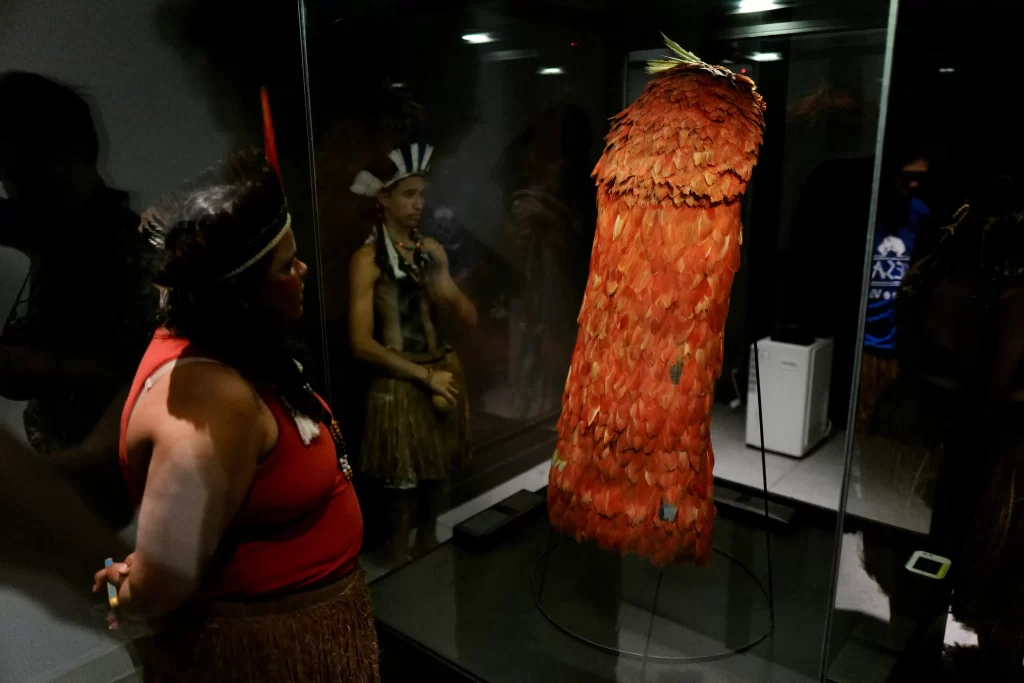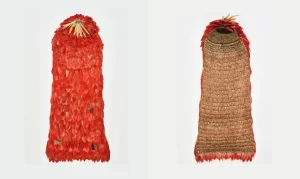Denmark returns iconic indigenous cloak to Brazil
3 min read

In a momentous occasion for indigenous communities in Brazil, a sacred cloak that had been displayed in Denmark for over 300 years was officially returned. The cloak, intricately crafted from 4,000 red feathers of the scarlet ibis bird, was ceremonially unveiled in Rio de Janeiro, with President Luiz Inácio Lula da Silva in attendance.
The 1.8-meter-long cloak, historically significant to the Tupinambá people, was taken during the Portuguese colonial era and had been housed in Copenhagen since 1689. Its return has been celebrated as a significant act of cultural restoration, underscoring the ongoing struggles of indigenous groups to preserve their heritage and reclaim their ancestral lands.
The ceremony was marked by the presence of around 200 Tupinambá individuals who camped outside the museum, bringing drums and pipes filled with medicinal herbs as part of their traditional rites. Yakuy Tupinambá, who traveled over 1,200 kilometers from Olivenca in eastern Brazil, expressed a deep emotional response upon seeing the cloak. “I felt sadness and joy. A mixture between being born and dying,” he shared with AFP.
Indigenous chief Sussu Arana Morubyxada Tupinambá reflected on the cloak’s historical significance, stating, “Our ancestors say that when they [the Europeans] took it away, our village was left without a north.” This poignant remark highlights the cloak’s symbolic value in guiding and unifying their community.
The return of this cloak is part of a broader movement to repatriate indigenous artifacts held in museums worldwide. Many sacred Tupinambá capes, dating back to the 16th century, remain in European museums. The Tupinambá leaders argue that returning these artifacts is not merely about reclaiming physical objects but is also integral to recognizing and respecting indigenous peoples’ rights, lands, and cultural heritage.

Brazilian President Lula has previously committed to acknowledging indigenous land rights. However, formal demarcation of the Tupinambá’s territory is still pending. At the ceremony, Lula reiterated his stance against limitations on indigenous land claims, emphasizing his commitment to their rights. “I am also against the time limit on Indigenous land claims,” Lula stated. “I made a point of vetoing this attack against the indigenous peoples. But the National Congress, using a prerogative backed by law, overruled my veto. The discussion continues in the Federal Supreme Court. And my position has not changed: I am in favor of the rights of the indigenous peoples to their territory and culture, as established by the Constitution. Therefore, I am against the absurd idea of the limit on land claims.”
The Tupinambá people also face contemporary challenges, as their mineral-rich lands are increasingly threatened by large-scale agriculture and mining operations. The return of the cloak symbolizes not only the restoration of a cultural artifact but also a broader struggle for the protection and recognition of indigenous rights and lands.
The event underscores a growing global awareness of the need to address historical injustices and support indigenous communities in their efforts to reclaim their heritage and secure their rights.